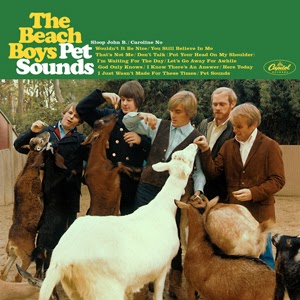Classic Album Review: Pet Sounds

February 22, 2021
When classic albums from the 1960s are brought up, what is often thought of? Of course the heavy hitters from the British Invasion, such as the Beatles and Rolling stones are brought up with such genius records as Revolver and Let It Bleed respectively. Or even American artists such as Bob Dylan with a slew of classic records, such as Highway 61 Revisited.
One such band that is left by the wayside in the discussion of iconic albums is the Beach Boys. Particularly the 1966 record, Pet Sounds.
Pet Sounds is the culmination of the single handed genius of Brian Wilson and his mental struggles during that era of his life.
In 1964, Beach Boy Brian Wilson endured a nervous breakdown on a flight to the next spot in the bands tour. In 1965 he quit touring with the band in order to hone in his focus on making new music for the band upon their arrival back. Little did Brian know that the breakdown he endured was the first of many in his life, from his long undiagnosed paranoid schizophrenia. Which worsened with anxiety, substance abuse struggles, and a feeling of not being understood.
So in 1966, when the rest of the band came back, Brain showed them the recorded instrumentations of Pet Sounds, that he single handedly composed.
The album is literally the entire mind and creativity of Brian Wilson at its utter artistic PEAK. The album holds a plethora of experimental sounds and concepts, such as the use of animal noises, theromins, the use of “God” in a pop song, and breakaway from their then typical teeny-bopper style. The record holds such candid, powerful, and timeless songwriting from Brian.
The record holds many classics that people have likely heard without knowing who wrote them, such as Wouldn’t It Be Nice and God Only Knows. Both use experimental instruments in pop songs, such as Accordions and French horns respectively. These songs have such infectiously catchy and gorgeous melodies, along with such idealistic lyrics that depict different feelings of love that were not often touched upon in that era.
My personal favorite tracks are That’s Not Me, I Just Wasn’t Made For These Times, and Caroline, No.
The first two cover such intimate and relatable struggles in their lyrics and soundscapes. Brian’s hopeless yearning for independence that he wrote about in That’s Not Me is so touching, especially having “packed up and split for the city” myself in my own life, that experience being me shipping out to Basic Training.
I Just Wasn’t Made For These Times is the MOST resonant song I have ever heard in my life. Its blunt lyrics about wanting to fit in and thinking things are gonna go good just to be ruined strike me in such a personal way. I am not ashamed to admit that I have shed tears to this track often. Brian’s personal pain and feelings of being ahead of his time are so gorgeous. Along with the yearnful singing that sounds like pain that has just been accepted.
Caroline, No is the last track that especially hits me. It covers the topic of someone you used to know having changed and not being recognizable to how you used to know them. Brian’s melodies are genius, especially in the bridge where he states,
“It’s so sad to watch a sweet thing die”
And the lyrics that epitomize the relatability in this track are its opening lyrics,
“Where did your long hair go?/ Where is the girl I used to know?”
When thinking about everything metaphorically, you can really insert your personal experience of people’s changes as their metaphorical “long hair” leaving.
The record just holds such symphonic masterpieces such as the genius Sloop John B, Don’t Talk (Put Your Head On My Shoulder), You Still Believe In Me, and I’m Waiting For The Day.
These songs are just so geniusly composed and played gracefully by the LA session musician group The Wrecking Crew.
Overall this album is a timeless classic, with such beautiful compositions and resonant lyrics that impact this teenager almost 60 years beyond its release.
All I can say is I implore EVERYONE to check out this utter masterpiece. Brian Wilson is far more than the Surfin’ USA self he was in the early 60s.